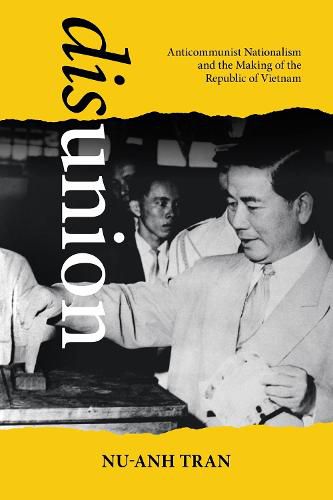Readings Newsletter
Become a Readings Member to make your shopping experience even easier.
Sign in or sign up for free!
You’re not far away from qualifying for FREE standard shipping within Australia
You’ve qualified for FREE standard shipping within Australia
The cart is loading…






Since the 1950s, the domestic politics of the Republic of Vietnam (RVN) has puzzled outside observers. To these external analysts, the American-backed regime seemed to be plagued by instability and factionalism for no apparent reason. Their bewilderment, however, has obscured a deep and complex history. In Disunion, Nu-Anh Tran shows how factional struggles in the Saigon-based republic reflected serious disagreements about political ideas at a pivotal moment in the lead-up to the Vietnam War.
The book traces the emergence of Vietnam’s anticommunist nationalists back to the struggle for independence and explores how their alliances were tested and then broken during the rule of the RVN’s first president, Ngo Dinh Diem. The anticommunists rejected the authoritarianism and ideology of the Vietnamese communists and dreamed of building an independent, democratic government that would unite the Vietnamese nation. The RVN was supposed to be the fulfillment of this long-cherished vision. But discord soon erupted among the anticommunists. Politicians fiercely debated to what extent the government should be democratic and which groups had a legitimate place in political life. The unresolved disagreements provoked intense and continuous infighting that troubled the RVN throughout the regime’s existence. Ultimately, the animosity undermined any possibility of realizing the anticommunists’ shared vision for the country.
Based on previously neglected primary sources and extensive research in Vietnamese and American archives, Disunion paints a rich and sensitive portrayal of leaders and activists in the RVN. Anticommunist nationalists were deeply devoted to their homeland and inspired by forward-looking visions, but they were also hobbled by their failure to live up to their lofty ideals. By examining these historical figures on their own terms, the book offers a fresh perspective on the political history of South Vietnam that has remained misunderstood to this day.
$9.00 standard shipping within Australia
FREE standard shipping within Australia for orders over $100.00
Express & International shipping calculated at checkout
Since the 1950s, the domestic politics of the Republic of Vietnam (RVN) has puzzled outside observers. To these external analysts, the American-backed regime seemed to be plagued by instability and factionalism for no apparent reason. Their bewilderment, however, has obscured a deep and complex history. In Disunion, Nu-Anh Tran shows how factional struggles in the Saigon-based republic reflected serious disagreements about political ideas at a pivotal moment in the lead-up to the Vietnam War.
The book traces the emergence of Vietnam’s anticommunist nationalists back to the struggle for independence and explores how their alliances were tested and then broken during the rule of the RVN’s first president, Ngo Dinh Diem. The anticommunists rejected the authoritarianism and ideology of the Vietnamese communists and dreamed of building an independent, democratic government that would unite the Vietnamese nation. The RVN was supposed to be the fulfillment of this long-cherished vision. But discord soon erupted among the anticommunists. Politicians fiercely debated to what extent the government should be democratic and which groups had a legitimate place in political life. The unresolved disagreements provoked intense and continuous infighting that troubled the RVN throughout the regime’s existence. Ultimately, the animosity undermined any possibility of realizing the anticommunists’ shared vision for the country.
Based on previously neglected primary sources and extensive research in Vietnamese and American archives, Disunion paints a rich and sensitive portrayal of leaders and activists in the RVN. Anticommunist nationalists were deeply devoted to their homeland and inspired by forward-looking visions, but they were also hobbled by their failure to live up to their lofty ideals. By examining these historical figures on their own terms, the book offers a fresh perspective on the political history of South Vietnam that has remained misunderstood to this day.